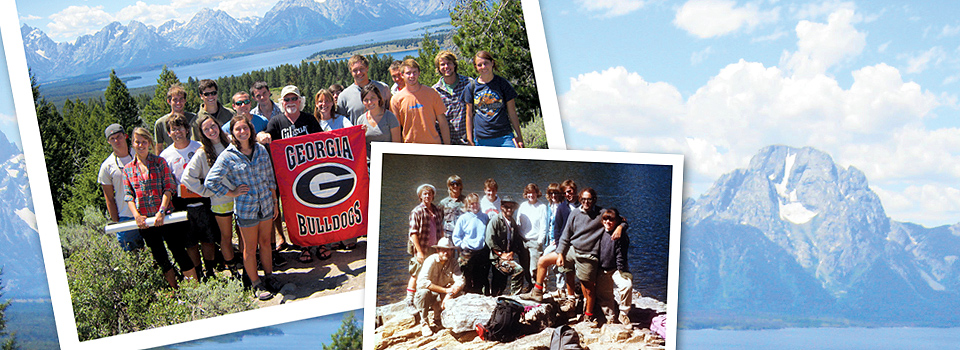During an eight-week period each summer, students in UGA’s Honors Interdisciplinary Field Program trek across 21 states on a journey that takes them to some of the nation’s most spectacular national parks and monuments.
The students conduct fieldwork, take exams and earn course credits in geology, anthropology, ecology and physical education. Along their 12,000-mile adventure, they study Anasazi Indian culture at Mesa Verde in Colorado, the ecology of old-growth forests in the Pacific Northwest, the origins of life at Yellowstone, the geologic history of the Grand Canyon, glaciology at Yosemite and volcanism at Mount Saint Helens. Now in its 25th year, students in the program have traveled enough miles to circle the Earth 12 times. The program attracts students from a diversity of majors at UGA-within and outside of the Honors program-as well as from other universities across the U.S.
“Students learn about the complexity of natural systems and that there is no disconnect between disciplines like ecology, anthropology and geology,” said Paul Schroeder, a professor of geology in the UGA Franklin College of Arts and Sciences who has been teaching in the program, which has been co-sponsored by the university’s Honors program and geology department, since 1993.
When visiting Point Reyes National Seashore in California, for example, students learn about the links between the region’s natural history and its past, present and future human use. Erosion not only affects land use, Schroeder pointed out, but also the region’s ecology and even politics. “These relationships are complex, but at the same time understandable,” Schroder said.
“Students learn to think critically and to view issues from different angles,” he added, “and those skills transfer to economics, medicine, law and any number of fields.”
Liz Stanley was a music major when she participated in the program in its inaugural year. Looking back, she said it instilled in her an appreciation of the natural world and challenged her physically as well as academically. “I think the program helped develop my sense of adventure and willingness to try new and unfamiliar things, and explore topics that I otherwise wouldn’t have thought to consider,” said Stanley, who is now a computer programmer.
Alumna Beth Shapiro, a former UGA Foundation Fellow who is now associate professor of ecology and evolutionary biology at the University of California, Santa Cruz, credits the program with inspiring her to pursue a career in science. “When we got back, I switched my major from broadcast journalism to ecology, with a minor in geology,” the Rhodes Scholar and MacArthur Foundation “Genius Award” recipient said. “Now my professional life combines everything I learned there; I’m a paleontologist, ecologist and geneticist all in one.”
Continuity and Change
In many important ways, the program remains unchanged from its inaugural year in 1988. The students and faculty travel by van and move every few days to a new campsite. A support truck carries the group’s gear and kitchen facilities, and students assist with camp chores and meal preparation under the direction of camp managers and cooks. Students carry out field investigations and hike during the day and take exams and participate in campfire lectures and discussions at night.
Despite the continuity, Schroder said technology and even the perspectives of the students have changed the program over the years. Cellphones make it easier to stay in touch with friends and family, but the program often ventures off the grid and away from mobile networks, which gives students an opportunity to reflect on what they’ve learned and to bond with their classmates. During long stretches on the road, the students stay immersed in the subject matter by watching films about water scarcity, conservation and related issues via a media storage system that wirelessly transmits to the students’ laptop and tablet computers.
Schroeder also has noticed a shift in the perspectives of students. Today’s students are far more interested in sustainability than their predecessors, he said, and the participation of faculty from the UGA Odum School of Ecology and the Franklin College’s department of anthropology have helped give students a more holistic perspective.
The UGA Interdisciplinary Field Program has been the catalyst for similar programs at other institutions, including a field camp sponsored by Bowling Green State University that was founded by Nikki Elkins, a 1996 participant in the UGA program. Still, Schroder points out that the multitude of experiences that the UGA program offers continues to set it apart.
“We’re really one of the few universities anywhere that runs a trip of this size, magnitude and diversity,” Schroeder said. “A lot of universities will run local trips in their area, but nobody really travels to the extent that we do. And it’s been sustained for 25 years.”
